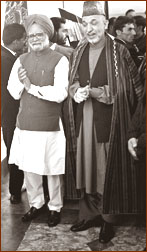|
DAILY NEWS ONLINE |
|
|
|
OTHER EDITIONS |
|
|
|
|
|
|
|
|
|
OTHER LINKS |
|
|
|
|
|
|
  |
|
|
|
|
Indian Premier Manmohan Singh's official visit to Afghanistan - the first by an Indian Head of Government since 1976 - points to a keenness on the part of New Delhi to consolidate its influence in South West Asia and help in holding religion-based militancy in check in the region.
A joint declaration issued by the Indian and Afghan authorities in the course of the visit said, among other things that: "The two leaders condemned global terrorism as a threat to democracy and declared that there can be no compromise with those who resort to terrorism." Earlier, Indian Foreign Secretary Shyam Saran clarified the Indian position as follows: "We want Afghanistan to emerge as a democratic, independent, sovereign country, fully in mastery of its own destiny."
It should not come as a surprise that besides continuing its program of military cooperation with Afghanistan and pursuing in that state its assistance ventures in particularly the sphere of infrastructure development and education, India would be directing a 50 million dollar assistance package to Afghanistan for grassroots development.
In fact, India ranks as one of Afghanistan's foremost aid-givers with poverty-alleviation proving a principal thrust in this wide-ranging assistance program. This is sound conflict-resolution thinking because there is no better way of blunting religious militancy, which is a prime destabilizing factor in India itself, than by New Delhi helping to alleviate poverty in its strategically-located neighbours.
Thus the emergence of Afghanistan as a prime target of India's development and military assistance. Given the continuing insurgency in Indian-controlled Kashmir and its international ramifications, it would be in India's interests to bolster the democratic process in Afghanistan and to help in ensuring that the conditions are right for the holding of parliamentary elections in Afghanistan on September 18.
Ensuring poverty alleviation among Afghanistan's disaffected and helping them to integrate closely into the democratic process, is a worthwhile option New Delhi is apparently not allowing to go unexploited, in view of the need to neutralize the forces of religious extremism in the region.
In the context of these security-related issues in South-West Asia, there seems to be a confluence of interests between India and the US, in whose "war on terror" India is an ally. The formulation of the India - US 'Framework of Defence Agreement' would only further stimulate commonality of purpose between Washington and New Delhi in South West Asia and the Persian Gulf region.
However, there could be some foundation to the observation that India is also seeking to blunt Pakistan's influence in Afghanistan by seeking a greater engagement with the Hamid Karzai administration.
One of India's longer-term aims could also be the counterbalancing of China's growing military and economic clout in the Central Asian region.
This is an interesting reversal of trends in international politics, manifest, for instance, in the Seventies and Eighties, when there was commonality of purpose between India and the then Soviet Union, with which New Delhi enjoyed, among other things, a defence treaty. In those years, just prior to the crumbling of the Soviet Union in the late Eighties, India proved a worthy ally of the then number one communist power.
The Soviet Union's military incursion into Afghanistan in 1979 was condemned by most states in this region. India was guarded in its criticism of this violation of Afghanistan's sovereignty by not naming the Soviet Union.
That was, however, a different age in world politics. Today, India is in agreement with the US on a number of crucial issues including economic strategy. In fact it is Dr. Manmohan Singh, today the Prime Minister of India, but in the early Nineties as Finance Minister of a Congress government, who is credited with having launched India on its economic liberalization program.
China is seen by both India and the US, as a land of vast economic opportunities, but they would prefer to counterbalance China's power in Asia - growing economic ties notwithstanding.
Given these considerations, India would consider it to be in its interests to neutralize simmering trouble - spots in its neighbourhood, such as Afghanistan, which could invite the interest of extra-regional powers.
|
|


